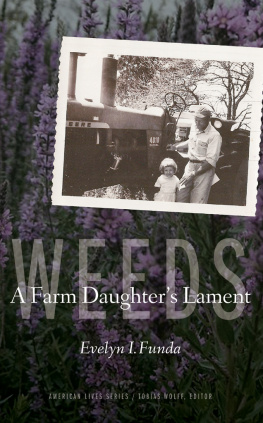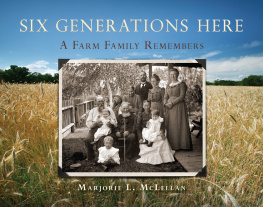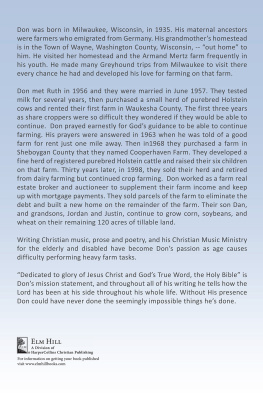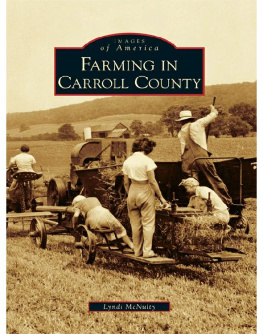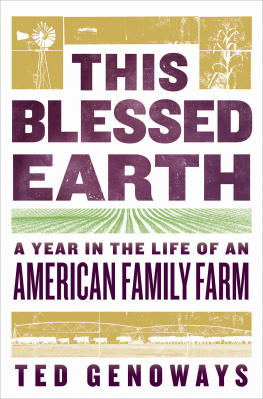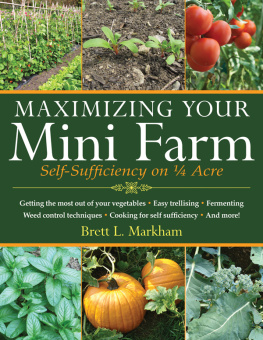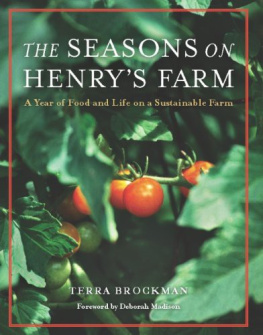


2013 by the Board of Regents of the University of Nebraska. Acknowledgments for the use of copyrighted material appear
on pages 27980, which constitute an extension of the copyright page. All rights reserved. Manufactured in the United States of America.
Library of Congress Cataloging-in-Publication Data
Funda, Evelyn I.
Weeds: a farm daughters lament / Evelyn I. Funda.
pages cm. (American lives)
Includes bibliographical references.
Epub ISBN 978-1-4962-0980-1
Mobi ISBN 978-1-4962-0981-8
1. Family farmsIdahoGem County
History. 2. Funda, Evelyn I. 3. Czech AmericansIdahoGem County. I. Title.
S 451. I 2 F 86 2013
636.0840979627dc23 2013008782
Set in Fanwood Text by Laura Wellington.
Designed by A. Shahan.
Publication of this volume was
supported by a gift from Sigmund
A. Rolat and by grants from the
Holocaust Educational Foundation
and from the Conference on Jewish
Materials Claims Against Germany.
What would the world be, once bereft
Of Wet and Wildness?
Long live weeds and the wildness yet
GERARD MANLEY HOPKINS
Inversnaid

What is a farm but a mute gospel? The chaff
and the wheat, weeds and plants, blight, rain,
insects, sunit is a sacred emblem from the
first furrow of spring to the last stack which the
snow of winter overtakes in the fields.
RALPH WALDO EMERSON
Nature

I believe that the only good weed is a dead
weed, and that a clean farm is as important
as a clean conscience.
FOURTH PRINCIPLE OF THE
PROGRESSIVE FARMERS CREED,
published by the Illinois Educational
Bulletin (found reprinted in the
June 6, 1912, issue of the Buhl Herald )
LIST OF ILLUSTRATIONS
Figures following
PREFACE : In Dirt We Trust
To forget how to dig the earth and
tend the soil is to forget ourselves.
MAHATMA GANDHI
Mind of Mahatma Gandhi
In late 2001 my small family suffered what I think of as a triple tragedy. On October 1, 2001, my father, Lumir Funda, age seventy-nine, was diagnosed with advanced lung cancer that, by the time of the diagnosis, had metastasized to his brain, liver, spleen, spine, and bones. The prognosis was two to four months to live; he was briefly given radiation to relieve some of the pain and to shrink the tumor that had compromised his speech and mobility before he was sent home with my mother on October 23. On October 25, just two days later, my mother, Toni, age seventy-five, suffered a heart attack. After nine days in a cardiac unit, where she experienced additional complications of stroke, kidney failure, and internal bleeding, she died on November 3. My fathers death came shortly thereafter, on November 29.
These events were preceded by the sale of the familys farmland. Just a month to the day before my fathers diagnosis, my parents had signed the papers finalizing the sale of the last parcel of farmland they had worked together since my father and my Czech-immigrant mother had married in 1957. In fact, my father had farmed this land for most of his life. His father, also a Czech immigrant, had originally purchased it for a small sum in 1919 when the parcel was nothing but a sheep-grazed, sagebrush terrain. Although the land was never hugely profitable, my family was always proud of how they had transformed that unlikely spot.
When people talk about the autumn of 2001, these are the losses I think about, not the Twin Towers. The news of 9/11 seemed like a blurry background to my own razor-sharp losses that fall. Some would say that the timing of these events in family history was merely coincidental; bodies fail, land deeds change hands, and people endure losses. Cutting through the hardpan of my family history, I could make out the repeated strata of losing home, family, and a sustaining belief in agricultural values. As I considered individual family stories, I found a series of literal and psychic displacements, a history of transience, obsession, and dispossession, and a hunger for permanence. Farmland came to represent a landscape of loss, and I recognized how my family stories were emblematic of a cross-section of American agricultural history, as it moved from the optimism of the immigrant homesteader, to the industrial illusion of control that characterized the postwar farm, to the economic and political pressures of the 1970s and 1980s that nearly erased the Jeffersonian ideal of one manone farm, to the exodus of younger generations, like mine, who left because they felt the farm held no place for them.
Influenced by personal narrative, biography, and cultural studies, this cultural memoir traces how different factors (ethnic prejudice, an increasingly industrialized agricultural model, and prescribed gender expectations) lead inevitably to similar endings. The loss at the center of this farm story, therefore, is replayed and recast in ever-widening circles, first through my farm daughter story, then through the generations of my familial and ancestral history. Even though my father and grandfather trusted wholeheartedly that the Idaho farmland would sustain the family both economically and spiritually, instead displacement is the ever-present theme in the lives of three generations for whom farming became a ritualized enactment of the desire to set down roots in a land we could claim as our own.
Although the American farmer has been mocked as a Reuben Hayseed and an unsophisticated bumpkin, he remains iconic, an enduring symbol of strength, valor, and a distinctive connection with the land. The very word human derives from the same Latin root word as humus , meaning soil. No other work or occupationwith perhaps the exception of motherhoodis so profoundly invested with such symbolic weight or so fully spans the imaginative range of human experience in our culture. Read the agrarian novels of Willa Cather or the impassioned essays of Wendell Berry, consider the rhetoric of the Farm Aid organization (with its motto: Family Farmers, Good Food, A Better America), watch any number of films about farmers (from Jessica Langes Country to the 2007 award-winning documentary The Real Dirt on Farmer John ), study Victory Garden posters from World War II or farmers market posters of today, and you will see agriculture cast in a wide array of starring roles. Farming is portrayed as a form of spiritual fulfillment, an act of artistry and divine creation, an expression of national commitment and patriotism, a means for proving heroism or manhood, a process of gaining personal empowerment, a foundation for community unity, a guarantee of personal independence and self-sufficiency, a chance to arrive at an authentic and wholesome life, a method for gaining dominion over and improving an imperfect landscape, a partnership with natural forces, and a battle against those same natural forces.
Farming is not just a jobits a calling, and the farmer is ubiquitous in our lives. Take, for instance, the bumper sticker that reads, If youve eaten today, give thanks to a farmer. Referenced in Senate hearings on the state of agriculture during the 1980s farm crisis, this sentiments religious overtones are not, I think, by accident. Poised as he is between heaven and earth, the farmer is our mediator, a cultural idea emphasized by Michael Pollan, who writes in The Botany of Desire , Wheat points [us] up, to the sun and civilization, because it is as leavened with meaning as it [is] with air. Wheat begins in nature, but it is then transformed by culture through a miracle of transubstantiation, in which wheat becomes the doughy lump of formless matter [that] rises to become bread. This process, says Pollan, is one of transcendence that symbolizes civilizations mastery of raw nature. A mere food thus became the substance of human and even spiritual communion, for there was also the old identification of bread with the body of Christ.
Next page
